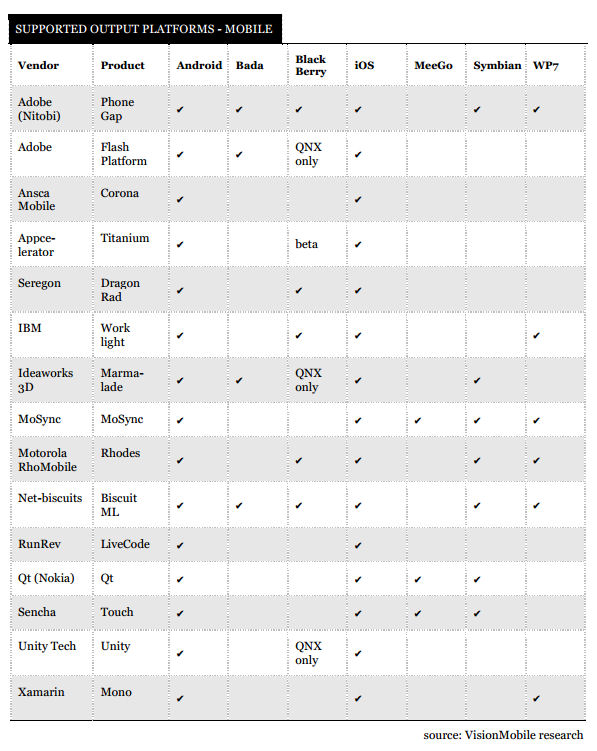If you're a developer looking at or already using cross-platform development tools the VisionMobile report provides an invaluable summary of the current state of the market as well as insight into likely developments over the next few years.
Some of thekey findings from the report include:
- PhoneGap and Sencha lead developer mind share, with 32% and 30% respectively.
- Cross-platform tools flatten the playing field. VisionMobile say that they are challenging the Apple/Google duopoly, noting that: " 2012 marks an inflexion point in the war of mobile ecosystems where the network effects built by Apple and Google are being challenged by an unsuspected new entrant. Cross-platform tools (CPTs) make it easier for example for an iPhone developer to reach Android and Windows Phone 7 users. CPTs dilute network effects by allowing other ecosystems to compete not just in terms of the number of apps listed, but also the availability of top apps, the time-to market (an app rarely appears at the same time across all platform app stores) and the overall app quality".
- Cross-platform developer tools reduce entry barriers and democratise app development by: "allowing developers from any language (HTML, Java, C++), any background (hobbyist, pros, agencies, corporates) and any skill level (visual designer to hard-core developer) to build mobile apps".
- HTML 5 has "has emerged as the most widely supported authoring technology for cross-platform apps". And the tools are taking HTML further than the browser because they allow developers to create native smartphone apps. This is an effective unification of the authoring side, rather than the runtime side.
- Cross-platform tools will complement, not compete with native development. This is because the cross-platform tools will always, by their nature, be behind the definition of platform APIs.
- Hybrid apps (those which are created use web technologies, but distributed through apps stores) provide a best of both worlds approach and may provide a partial answer to the deploy via web browsers versus the deploy via native app question.
- Access to additional platforms is the most important criteria for developers when choosing a tool, and monetisation in the least important.
- The biggest barrier to adoption of cross-platform tools is feature parity with native platforms and performance issues (cited by 29% of developers as a reason for dropping a tool).
The report also looks at the top 15 cross-platform tools in more detail, including this breakdown of which tool supports which platform:

The full report can be downloaded from CrossPlatformTools.com.
